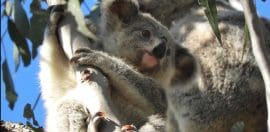A solar powered solution to save our koalas

Koala with the solar powered tracking ear chip
24 July 2021 at 12:00 pm
Solar power technology will help locate koalas when bushfires are approaching
With more than 60,000 koalas affected by last year’s summer bushfire crisis, a new project is harnessing the power of the sun to protect the animals from future disasters.
Koala ecologist Dr Romane Cristescu and her team at the University of the Sunshine Coast are the brains behind the project, developing a solar powered ear tag for koalas, around the size of a five cent coin, that tracks their location.
Cristescu told Pro Bono News that she realised there was a need to develop a more efficient way to locate injured koalas after the 2019/20 summer bushfires.
“Trying to locate all the koalas that had survived the fires… was like finding a needle in a haystack,” Cristescu said.
“We spent a lot of days just looking for survivors, and obviously that gives you a lot of time to think of better ways to do things.”
Thanks to new funding from the World Wildlife Fund for Nature-Australia (WWF), the tags are now being developed with Very High Frequency technology (VHF), which can be picked up for hundreds of metres, as opposed to using Bluetooth signals which only travel for 20-30 metres.
“VHF solar ear tags will enable us to locate koalas and take them into care when a large bushfire is approaching. Once the danger has passed, and their forest home is regenerating, we can return the koalas,” Cristescu said.
“In those first few months after koalas are returned to the wild we can find them again and do a visual health check to make sure they’re getting enough food. If necessary we can take them back into care.”
She said that using solar energy to power the tags meant they would last for the life of a koala.
The funding for the project is a part of WWF’s Regenerate Australia, a program that is – among other things – aiming to double the number of koala’s along the east coast of Australia by 2050.
There are eight other projects that are receiving a slice of a $1.32 million funding package, including a project building temporary cardboard homes for wildlife, and a study examining the role of wombat burrows in helping animals shelter from fires and predators.
WWF-Australia CEO Dermot O’Gorman said the Regenerate Australia project was reimagining how to solve the problems facing Australia’s flora and fauna.
“Bold new ideas are crucial to help restore species and landscapes, build their resilience, and adapt to a changing climate,” he said.
Find out more about the projects here.







